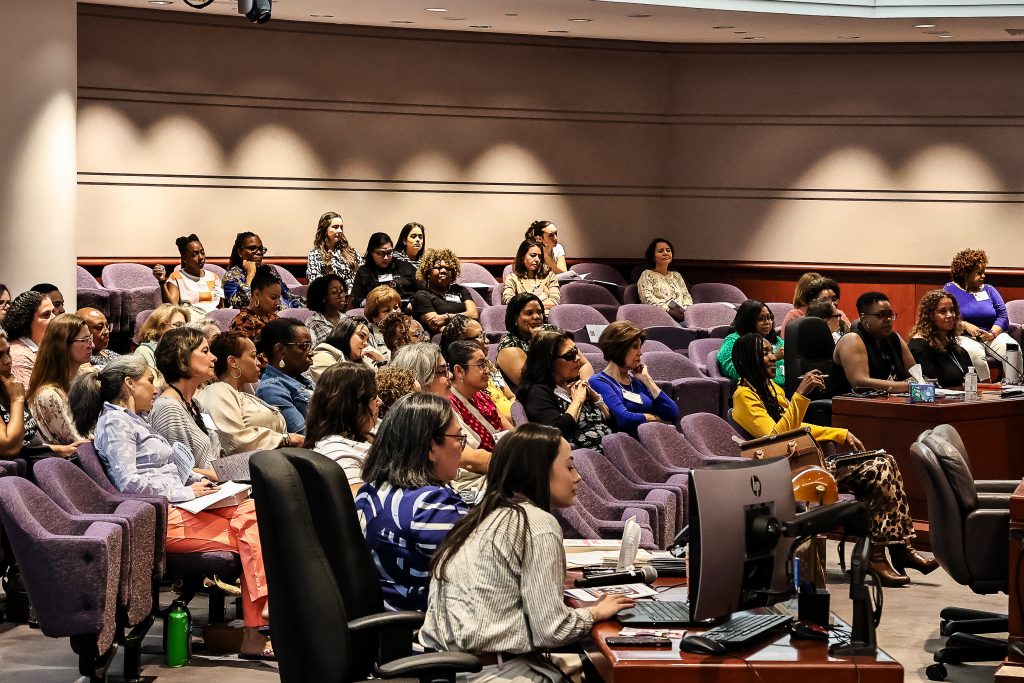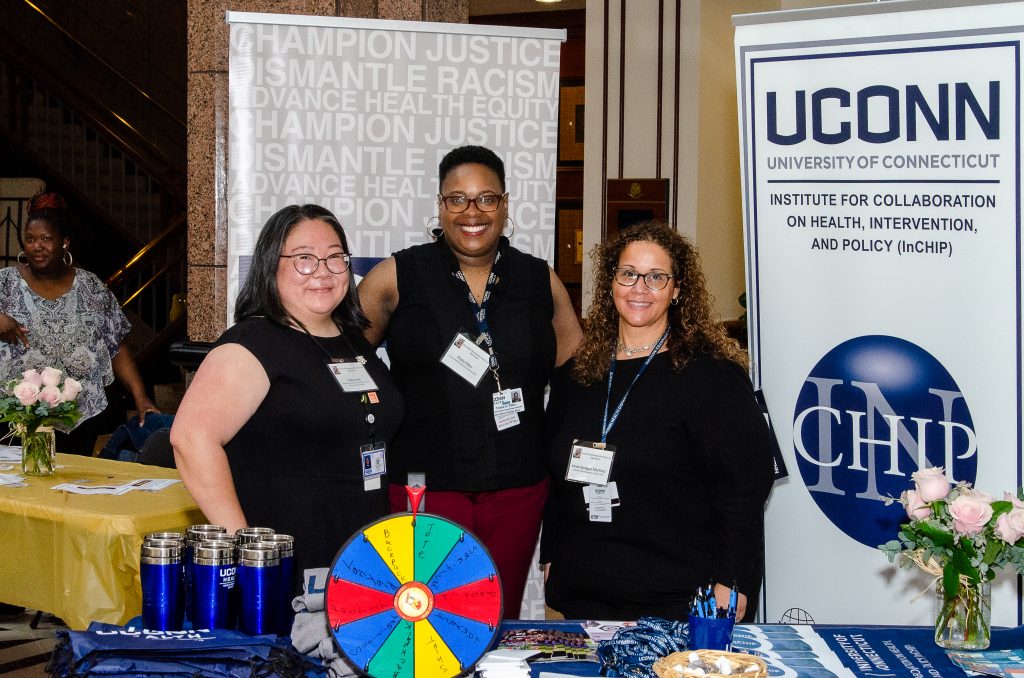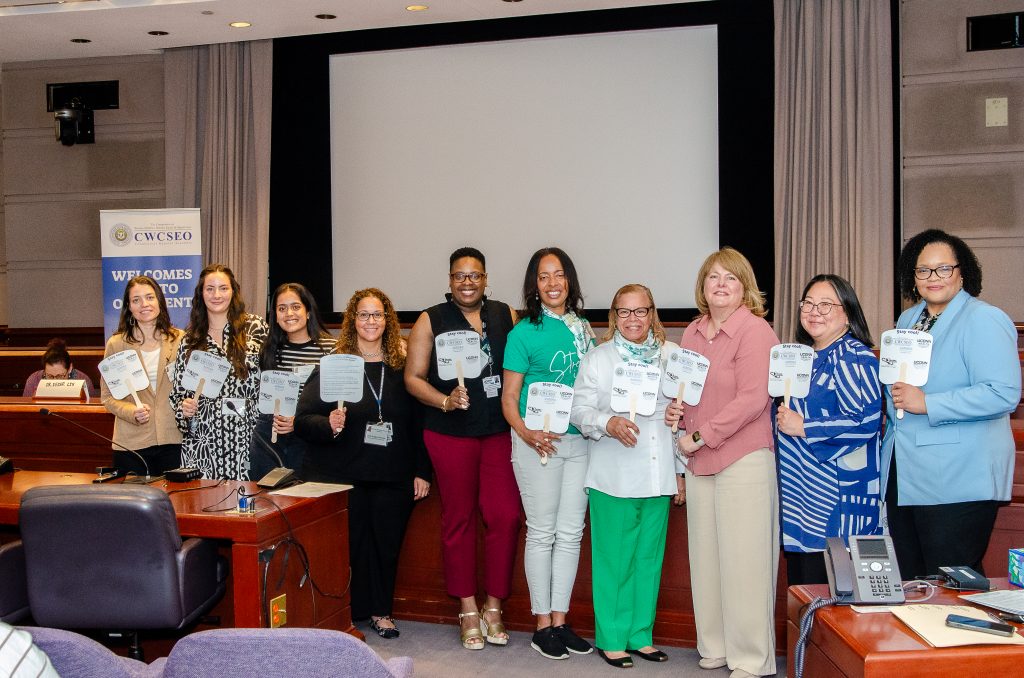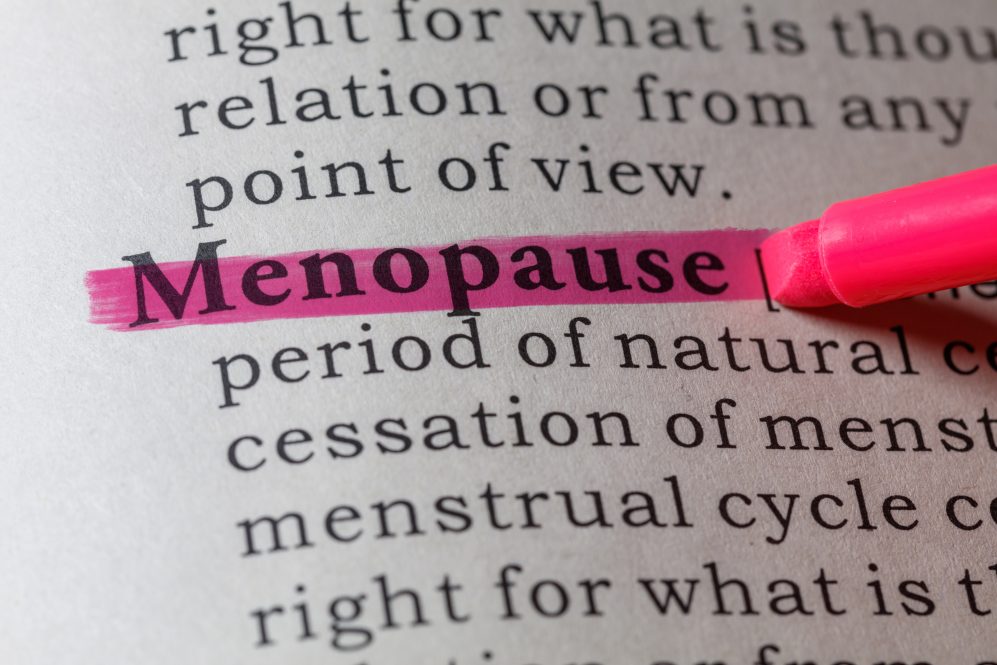On May 3 , the UConn Health Disparities Institute (HDI), in partnership with the Commission on Women, Children, Seniors, Equity and Opportunity (CWCSOEO); the Farmington

Valley (CT) Chapter of The Links, Incorporated; the Aurora Foundation for Women and Girls; and the UConn Institute for Collaboration on Health, Intervention, and Policy, kicked off Women’s Health Month by welcoming over 100 women to the Legislative Office Building in Hartford. Attendees gathered to learn, share, and connect around a natural life transition that impacts all women but is rarely discussed: menopause.
The event began with a screening of The (M) Factor: Shredding the Silence on Menopause, a PBS documentary that explores menopause through personal stories, expert insights, and powerful truths. A lively and candid panel discussion followed, moderated by Melvette Hill, executive director of CWCSOEO. Panelists included:
- Ivy M. Alexander, UConn School of Nursing, expert in midlife women’s health
- Jessica Kluewer-D’Amico, UConn Health psychiatrist and geriatric mental health specialist
- Feier Liu, UConn Health psychiatrist with expertise in women’s mental and holistic health
- Carla Rae-Gunn Samson, OB-GYN and Director of Women’s Health at Community Health Services
Together with the audience, the panel explored the medical, psychological, and cultural dimensions of menopause, emphasizing the racial and ethnic disparities in care, symptoms, and treatment access.
 In addition to the film screening and panel, resource tables from local organizations and our partners were present. These tables offered valuable information, support, and tools related to menopause and women’s health, giving attendees access to practical resources and care pathways.
In addition to the film screening and panel, resource tables from local organizations and our partners were present. These tables offered valuable information, support, and tools related to menopause and women’s health, giving attendees access to practical resources and care pathways.
“We weren’t just talking. We were learning, laughing, and loving ourselves and our bodies,” said Dr. Linda Sprague Martinez, director of UConn Health Disparities Institute. “Menopause is a natural part of women’s development that has been both overlooked and pathologized for far too long. If we don’t talk about it, we can’t address it and certainly won’t understand it. All women experience menopause, and it has implications for family and community health. Yet despite its widespread impact, it remains under-researched, underfunded, and widely misunderstood.”
Each year, approximately two million women enter menopause. This natural transition brings physical and emotional changes that can profoundly affect a woman’s well-being, relationships, and quality of life. Yet many women go through it alone, suffering in silence without access to the health information, care, or support they need.
Research shows that racial and ethnic disparities affect both the experience of menopause, and the quality of care received. For example, the early onset of menopause—more common among Black and Hispanic women—has been linked to an increased risk of heart disease later in life. Additionally, hot flashes and night sweats tend to last longer than expected, especially for women of color:
- Black women: 10.1 years
- Latinas: 8.9 years
- Non-Hispanic white women: 6.5 years
- Chinese American women: 5.4 years
- Japanese American women: 4.8 years
(Source: Pausitive Health)

“We know health care inequities are pervasive and that women’s health has not been a priority,” said Trisha Pitter, director of Community Learning and Engagement at HDI. “Providers aren’t getting the training they need to understand and support women fully across the life course. This is a problem. We’re prioritizing menopause and menopause education to break the silence and address health care inequities.”
Real Stories, Real Support
The heart of the event came from the attendees themselves. Many women bravely shared personal stories about managing symptoms like hot flashes, sleep disruptions, mood swings, and joint pain, experiences that have often been both physically and emotionally overwhelming.
Audience members expressed deep gratitude for having a space to finally speak openly.
Notably, men also attended to support their partners. One participant shared: “This event helped me understand what my wife is going through, and how I can support her instead of standing on the sidelines.”
 What Comes Next
What Comes Next
As the event came to a close, a collective call to action was clear: “Carry what you’ve learned back into your communities. Let’s keep the conversation going, so no one has to face this natural transition alone.”
HDI and its partners are committed to expanding their efforts through:
- Raising awareness and education about menopause across Connecticut
- Advocating for inclusive, research-informed policies that prioritize women’s health based on their lived experiences
- Hosting a statewide Menopause Celebration in October to honor and empower women in this life stage
“We’re committed to breaking the silence and ending the disparities,” said Dr. Sprague Martinez. “This is just the beginning.”
About the UConn Health Disparities Institute
HDI was formed in 2011 through a legislative mandate.
Our vision is equitable health, education, and economic opportunity for all in Connecticut.
Our mission is to advance systemic change by tackling root causes of health inequities and implementing sustainable solutions through interdisciplinary community-based participatory research partnerships, data-driven community action, and workforce development efforts with communities disproportionately impacted by inequities.



